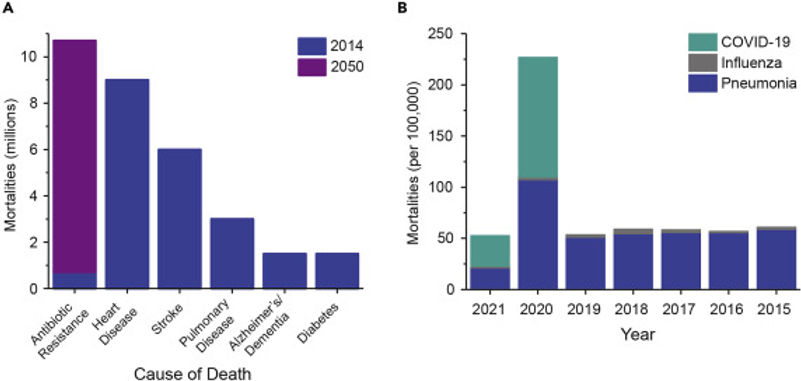By: Jacob Yang
As Covid-19 continues to spread, so do drug-resistant diseases (diseases that we once had a cure for, but now has mutated enough so that our medication has no effect on it). In fact, deaths caused by these viruses have rose by 15% in the first year of the pandemic alone, says the CDC.
“For the last 70 years, doctors have prescribed drugs known as antimicrobial agents to treat infectious diseases. These are diseases that occur due to microbes, such as bacteria, viruses, and parasites. The use of these drugs is now so common that some microbes have adapted and started to resist them, and it could result in a lack of effective treatments for some diseases. 2 million people become infected with antimicrobial-resistant bacteria in the United States every year and around 23,000 people die as a result,” says Dr. Daniel Murrell, who has a Ph.d in microbiology from the University of Tennessee.
Coronavirus has an extremely effective antibody which has increased people’s susceptibility to drug-resistant diseases. The bacteria Acinetobacter, for example, which is normally killed by the antibiotic Carbapenem, has become 78% more prominent since 2020. This is almost a direct cause by Covid-19. During the pandemic, when doctors and nurses had to treat endless amounts of patients, they prescribed antibiotics because it was the fastest way to tend to a patient. Every time a bacterium encounters an antibody, they slowly mutate and learn how to combat it. Therefore, when medical personnel tried to treat all people as fast as possible to shorten wait times, they also increased the number of diseases immune to their respective antibody.
This is also visible through economic lines. A study showed that most wait times in hospitals are those in places with high amounts of poverty. With Covid-19 destroying the global economy and leading many people into unemployment, the number of people in poverty have risen, leading to longer wait times and more drug-resistant infections. Dr. Rochelle P. Walensky, the director of the C.D.C, said in a report that “These setbacks can and must be temporary … The Covid-19 pandemic has made it clear — prevention is preparedness. We must prepare our public health systems to fight multiple threats simultaneously.”
Almost a third of antibiotics are not prescribed at the correct times, said Dr. Walensky in the same report. Mainly respiratory ailments like colds that are caused by viruses, and the pandemic has definitely not helped that cause, since over eighty percent of hospitalized Covid patients have been treated by antibiotics to fight the virus. To prevent the spread of these viruses anymore, as Dr. Walensky said, “prevention is preparedness,” we must use these antibiotics only when they are necessary and never elsewhere.











